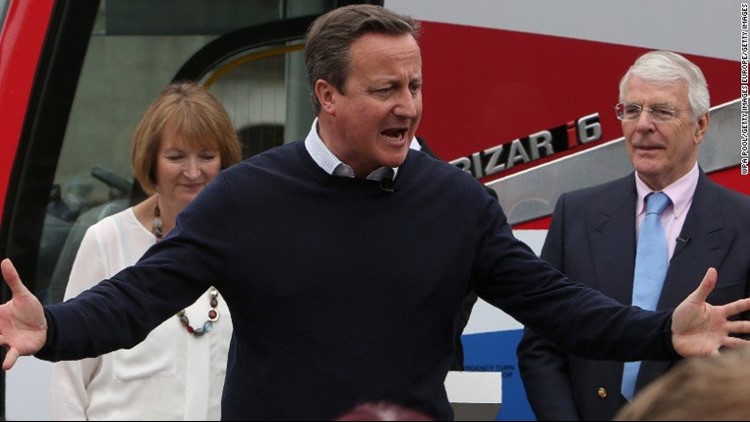LONDON — The vote-counting has started in a once-in-a-generation referendum on whether the United Kingdom should leave the European Union.
The final nationwide result is expected to be announced Friday morning. Polls have consistently shown voters split down the middle, with the outcome too close to call, and wavering voters likely to determine the result.
Polls closed at 10 p.m. (5 p.m. ET). As results come in, they will be announced by region rather than by constituency. The 12 regions include Scotland, Northern Ireland, Wales, London and eight English regions. Almost 46.5 million people were registered to take part in the historic vote.
British pollster YouGov published a poll taken Thursday, asking people how they actually voted. They contacted 4,772 British adults online and concluded: "The results are close and it's too early to call it definitively."
Sky News reported that Leave.EU and UKIP Leader Nigel Farage said, "It looks like Remain has edged it."
Later on Thursday, Farage didn't concede defeat but said the movement to dismantle the EU will succeed elsewhere, if not in the UK.
"The Euro-skeptic genie is out of the bottle and it is not going to go back," he said. "If we stay in this union, it is doomed. It is finished anyway."
Britons headed to polling stations beneath rainy skies in London, following torrential rains and thunderstorms overnight that caused flash flooding in parts of the capital and southeastern England.
Britain's Electoral Commission tweeted that those delayed on the way to polling stations should know that as long as they were standing in line to vote at 10 p.m., they would be able to cast a ballot.
Among the key political players casting their votes Thursday were UK Prime Minister David Cameron, who voted at a hall in London; Labour leader Jeremy Corbyn, who also voted in the capital; and UK Independence Party leader Nigel Farage, a leading "Leave" advocate, who voted in Westerham, England.
After the polls closed, Cameron tweeted: "Thank you everyone who voted to keep Britain stronger, safer & better off in Europe - and thousands of @StrongerIn campaigners around the UK"
Registered voters include Britons aged over 18 from England, Wales, Scotland, Northern Ireland and Gibraltar -- a British territory off the southern coast of Spain. Irish and Commonwealth citizens living in the UK are also eligible to vote.
One of the major groups wanting to leave the EU, Vote Leave, tweeted: "Whatever the outcome, it's been an incredible campaign. Thank you to everyone who was a part of this! #ProjectHope"
'Serious consequences'
Leading political parties and newspapers have been divided on the so-called Brexit, or British exit, from the European Union -- an outcome that would be a huge blow to the 28-member bloc.
French President François Hollande warned Wednesday that the result would have a huge impact on the future of the European Union.
"The departure of a country that is, geographically, historically, politically in the European Union would have extremely serious consequences," he said.
The UK has been a member of the European Union (and its precursors) since 1973.
Cameron negotiated with European leaders this year to secure improved terms of membership in the bloc if Britain stays in the EU.
European Commission President Jean-Claude Juncker warned Wednesday there will be no further renegotiation.
"We have concluded the deal with the Prime Minister; he got the maximum he could receive, and we gave the maximum we could give so there will be no kind of renegotiation," he said.
"Out is out."
Clashing sides
With many of the fundamental questions of the debate in dispute by the opposing "Leave" and "Remain" camps, the outcome may come down to a question of gut instinct for voters.
The rival camps have clashed on such core issues as whether a Brexit would help or hurt Britain's economy, throughout a rancorous campaign that has repeatedly returned to themes of security, sovereignty and immigration.
"Leave" campaigner Boris Johnson, a member of parliament and former London mayor, described the EU during a final centerpiece debate Tuesday as "a job-destroying engine."
"You can see it all across southern Europe and you can see it, alas, in this country as well," he said.
By contrast, the "Remain" camp, led by Cameron, has argued that a vote to leave would do lasting harm to Britain's economy.
The "Leave" camp has framed the referendum as a historic opportunity to "take back control" of Britain from Brussels, where most of the EU institutions are headquartered, with Johnson describing it as a potential "independence day" for Britons.
Their rivals have argued that Britain will be safer, more powerful internationally and more prosperous if it remains in the bloc.
The "Leave" campaign has raked in more funds than its opponents, according to Britain's Electoral Commission.
The pro-Brexit camp received just under £15.6 million ($22.9 million) in donations, while "Remain" got £11.9 million ($17.5 million) from February 1 to June 9, it said.
Toxic climate
The political climate leading up to the referendum has been unusually volatile, with both sides accusing each other of lying and scaremongering.
The tension reached its peak with last week's killing of Labour MP Jo Cox, a pro-"Remain" advocate in her first term in parliament. She was the first sitting British lawmaker to be killed since 1990.
Her husband, Brendan Cox, told the BBC she had been concerned about politics becoming "too tribal and unthinking."
"She was very worried that the language was coarsening and people were driven to take more extreme positions," he said.
On Wednesday, another Labour MP tweeted that she had received a death threat for her referendum campaigning.



